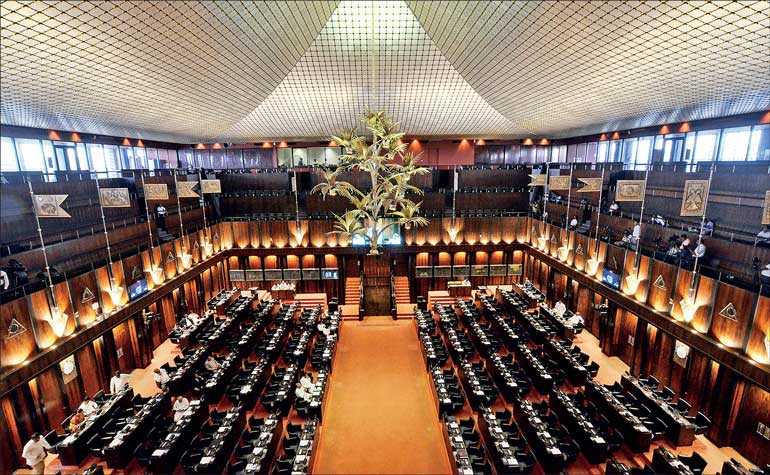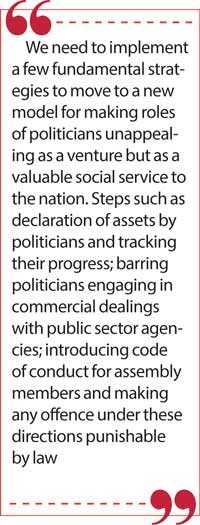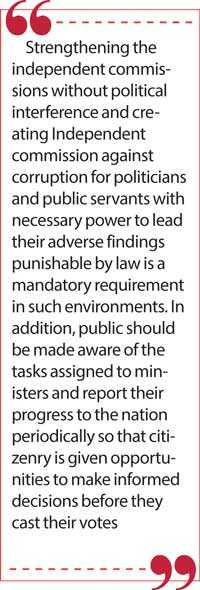Thursday Feb 19, 2026
Thursday Feb 19, 2026
Tuesday, 17 December 2019 00:00 - - {{hitsCtrl.values.hits}}

“In too many countries, people are deprived of their most basic needs and go to bed hungry every night because of corruption, while the powerful and corrupt enjoy lavish
lifestyles with impunity” – José Ugaz, Chair of Transparency International
Political authority
We can sketchily split the political history of Sri Lanka into two eras, roughly prior to 1970s (perceived as progressive period) and thereafter (apparent as digressive period). 
The pre-1970s roles as politicians were attracted to two groups of personalities, namely who wanted to gain enhanced social status while diligently serving the nation and others who struggle for the benefit of the average citizenry and thereby sincerely servicing the country as a whole.
Both these groups rendered immense services to our nation such as gaining universal franchise and independence while extending their services subsequently too. Such patriotic individuals hardly gain any personal benefit though or in some cases they even turned out to be poorer when they retired from their social services.
It is opportune to analyse the environment in which the pendulum started turning to worse. During 1971 youth uprising power of the elected representatives boosted significantly given the operational compulsions and ad-hoc methods that were used to bring the stability to the nation which was the national priority at that time.
The security apparatus got excessive powers and the local representatives basically became the guiding arm of the government over security forces. Sudden surge of the power of the politicians above the established levels became a threat to the accepted principles and norms of the society.
Under these circumstances people were forced to seek the intervention of politicians during the trouble time even to canvas the release of their family members and relatives that were taken into custody as suspects by the security forces.
Value of human life drifted down to the lowest level during such times where there were no formal investigations or post-mortems conducted to find out reasons behind their unfortunate deaths. Since then not only the country embarked on an irreversible path of destruction, it also lost the cream of the youth of over 100,000 though official figures reported it to be around 60,000.
It is not only the lives, but the enormous suffering the families had to undergo and the economic catastrophe experienced by the country. Misguided youth were part of the brightest from the younger generation country was blessed with in that era. However, the mysterious question is why on earth those youths lost their treasured lives when we witness the subsequent behaviours of the leaders who survived this unfortunate uprising. 
In this period, the power of the elected representatives moved to a different level which was never experienced by their predecessors. Adverse repercussion was the surge of political interference to a record level in every aspect of people’s lives including even gaining public sector jobs on so called ‘chit’ system.
This also led to corruption and malpractices in the political and administrative arenas without any accountability to the state and progressed them to an overwhelming phenomenon of the political and government sectors of the country as of today.
Constitutional changes
The new Constitution introduced in 1978 and subsequent amendments to electoral system created immense obstacles for a deserved person to become an elected representative of the parliament or similar bodies in the country.
A candidate will have to campaign within an electoral district rather than in a local electorate when the elections are in progress. As such there is a need for excessive resources including funds to meet campaign expenses. It is understood that the current norm is that even a person to contest as a provincial council candidate requires to spend over Rs. 50 million during the campaign.
It is not possible for any rational person to spend such exorbitant amount of money just to fulfil their moral duty to provide an honest and dedicated service to the society. Ultimate casualty of such mammoth cost is the lack of intellectuals that is essential in politics to steer the country on progressive path.
A closer review of elected members to the current parliament demonstrates that most of them are either the next generations of past politicians or people who have amassed wealth by any means or their children. Basically, abilities and skills required of elected representatives to steer the country on the progressive path are missing in Sri Lankan politics today. Political establishment in Sri Lanka has been muddied over the last 50 years or so though there are few capable politicians in the current parliament who can be the guiding force of the country and therefore we should be careful not to throw the baby with the bath water.
Going back to the electoral system is one and the easiest way to address this issue as candidates require only to campaign within the boundaries of the electorate instead of spreading their campaigns over a whole district. Such opportunities will significantly reduce the cost to be borne by potential candidates as well as making elected member’s task simple and transparent since they are only required to oversee the welfare of the people in respective electorate.
There have been calls, in some quarters for the abolition of the Provincial Council system which has become a massive funding drain and led to an administrative nightmare by duplicating many tasks. Many arguments were raised against abolition of PCs when this strategy was proposed in the past using flimsy excuses such as disadvantages that can be experienced by minorities.
We can easily find ways to address those concerns such as by allocating reserved number of parliamentary seats based on the number of votes minority parties received or creating upper chamber such as the Senate based on the principles adopted by Western democracies.
I admire opinions recently expressed by many writers including The Pathfinder Foundation leader Milinda Moragoda over the removal of provincial councils as this system proved to be an unbearable waste of scarce resources and wasn’t capable of addressing the intended purposes at the time they were established.
Need for a ‘workable democracy’
In mature democracies, party candidates’ eligible propaganda expenses meant to be met by the party and through fund raising initiatives launched for such endeavours. In addition, political parties are reimbursed for their entitled election expenses based on a formula on the number of votes they received in the election. Such strategies will no doubt address financial hardships faced by suitable candidates and remove rooms for existence of corruptions in the political system. 
The established culture of any country plays a fundamental role in consenting a suitable system of governance and its practicality depends on how compatible such systems with its established norms and practices.
For example, the modern management theories developed in the US in 1960s couldn’t be applied in France as intended due to the dynamics of the State’s culture though it sits in the ‘Western bloc’ of nations with comparable social values. Most Asian countries were custom to be ruled by Monarchs before embracing or forced upon the western democracy as a governing structure.
For a democracy to thrive it requires few fundamentals such as strong as well as independent media; access to be elected as a representative without pecuniary barriers; good understanding of the policies of different political groups by voters and not becoming victims to be minority parties where they become king-makers which is evident even in mature democracies today.
Proper democracy could only be functioned under such conditions and absence of them is the main reason for most of the countries to embark on highbred systems mixed with autocracy (with discipline). We have already witnessed in the Middle East whether the citizenry is better off with the autocracy or unworkable democracy where non-existence of above mentioned conditions for a well-functioning democracy.
Options and way forward
Corruption and nepotism should be discouraged for good governance and uninterrupted economic and social development. Sri Lanka should create an environment where politicians should be encouraged to use their energy and resources to provide services to the nation instead of using it for pecuniary gains and glorification of their lives. Such settings wouldn’t create openings for ‘political ventures’ by opportunistic individuals claiming to be people’s representatives.
We need to implement a few fundamental strategies to move to a new model for making roles of politicians unappealing as a venture but as a valuable social service to the nation. Steps such as declaration of assets by politicians and tracking their progress; barring politicians engaging in commercial dealings with public sector agencies; introducing code of conduct for assembly members and making any offence under these directions punishable by law.
Strengthening the independent commissions without political interference and creating Independent commission against corruption for politicians and public servants with necessary power to lead their adverse findings punishable by law is a mandatory requirement in such environments. In addition, public should be made aware of the tasks assigned to ministers and report their progress to the nation periodically so that citizenry is given opportunities to make informed decisions before they cast their votes.
The most important step is to revert to the electoral system where the politicians are accountable for their constituency and thereby electioneering is made more affordable and simpler for suitable candidates.
Some effective clauses of the 1978 Constitution which addressed a few issues discussed above have been amended in subsequent updates such as prohibiting member cross overs and minimum percentage of votes required for being elected as representatives. Such original clauses should be re-established and remove other loopholes to facilitate their proper implementation.
Both the Government and the citizenry must come together to achieve this vital national objective so that corruption and malpractices will be the casualty of such endeavours while the nation will achieve desired social and economic aspirations.
(Dr Nimal Edirisinghe is a graduate from the University of Sri Jayewardenepura; as well as Sri Lanka Law College and completed his postgraduate studies in Canada and Australia. He is a visiting lecturer of the Master of Business Administration program at the Sydney Business School of University of Wollongong, Australia and currently working for the Australian Government. Dr Edirisinghe can be contacted on [email protected].)